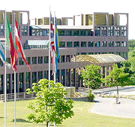EU Institutions

Institutions and other bodies of the European Union
List of all the institutions and other bodies of the European Union reported on the official website of the Union.

The European Commission
The Commission is one of the key bodies of the institutional system, it represents and protects the general interests of the European Union and plays a driving role in the integration process. It proposes laws, policies and action programs and implements the decisions of the Council and Parliament. The European Commission is a fundamental body of the EU that represents and protects the general interests of the Union. It has the exclusive power to propose new laws, develops policies and action programs in various sectors such as economy, environment and energy, and ensures the implementation of decisions of the Council and Parliament. The Commission is made up of one commissioner from each member state, including the President, and its decisions are taken collegially. It plays a crucial role in promoting European integration and ensuring compliance with EU law by bringing legal proceedings against Member States or companies in case of violations.

The European Parliament
The European Parliament is the representative assembly of all citizens of the member countries of the Union and participates, in its capacity as an elected body, in the legislative process. The European Parliament is the representative assembly of all citizens of the member countries of the European Union. It is made up of 705 deputies directly elected every five years. Deputies organize themselves into political groups based on political affinities. The Parliament participates in the legislative process together with the Council of the European Union, being able to propose amendments, approve or reject laws and carry out democratic control functions over the other EU institutions, in particular the European Commission.

The Council of the European Union
It is the main decision-making body of the European Union, bringing together the ministers of the member states according to the problems on the agenda. The Council of the European Union is the main decision-making body of the EU. It brings together the ministers of the member states based on the topics on the agenda. Its composition varies depending on the issues covered, with ten different formations specializing in various sectors such as general affairs, foreign affairs, economics and finance, justice and home affairs. The Council of the EU is responsible for adopting laws, coordinating policies, defining the common foreign and security policy, concluding international agreements and adopting the EU budget.

The Court of Justice of the European Communities
It guarantees compliance with community law and the correct interpretation and application of the treaties. The Court of Justice of the European Union (CJEU) ensures that EU law is respected and interpreted correctly. This includes the consistent application of the EU treaties. The CJEU has the power to interpret treaties and resolve disputes over their application. It uses the preliminary ruling procedure to ensure uniformity in the application of EU law between Member States. The CJEU can also hear direct appeals concerning the annulment of EU acts or non-contractual liability. Furthermore, it contributes to the protection of fundamental rights in the EU by interpreting the law in light of the EU Charter of Fundamental Rights.

The European Court of Auditors
It is the EU's external audit institution, helping to improve all aspects of the financial management of EU funds, playing an essential role for citizens. The European Court of Auditors, founded in 1975 and based in Luxembourg, ensures that European Union funds are spent legally, regularly and efficiently. It monitors the implementation of the EU budget, provides reports to the EU Parliament and Council and helps ensure transparency and accountability in EU financial management.

The European Ombudsman
It has the task of examining complaints lodged by citizens against cases of maladministration by EU institutions and bodies. The European Ombudsman is responsible for examining citizens' complaints regarding cases of alleged maladministration by EU institutions. It acts as an impartial intermediary, assessing complaints and making recommendations, although it has no binding legal powers. Its role is fundamental in promoting transparency and accountability in the work of the European institutions, offering citizens a means to assert their rights and interests.

The European Data Protection Supervisor
It has the task of ensuring respect for the right to private life regarding the processing of personal data by EU institutions and bodies.The European Data Protection Supervisor monitors and ensures that the EU institutions respect the right to privacy and protection of personal data. This body monitors data processing practices, provides advice and handles complaints from European citizens. Work with national authorities to ensure uniform application of data protection laws across the European Union.

The European Economic and Social Committee
The European Economic and Social Committee (EESC) is an advisory body representing employers, trade unions, farmers, consumers and other interest groups that collectively make up organized civil society.
The EESC acts as a bridge between the Union and its citizens, promoting a more participatory and inclusive model of democratic society.

The Committee of the Regions
The Committee of the Regions (CdR) is the consultative assembly of the European Union which guarantees the consultation of the public authorities closest to the citizens - mayors, municipal and provincial councilors, presidents of the regions - on the European Union proposals that directly affect them.

The EU Executive Agencies
A number of specialized and decentralized European agencies have been established to provide help and advice to Member States and their citizens. The agencies respond to the desire to geographically decentralize the bodies of the European Union and to the need to cope with new tasks of a legal, technical and/or scientific nature.
 Regione Veneto
Regione Veneto

